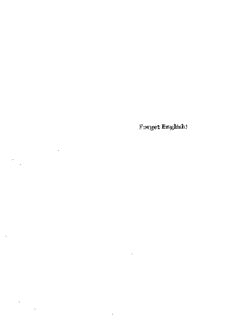
Forget English!: Orientalisms and World Literatures PDF
Preview Forget English!: Orientalisms and World Literatures
Forget Englishl ORIENTALISMS AND WORLD LITERATURES Aamir R. Mufti III Harvar ess Cambridge, MaSSU~f.lLLJI;HJ London, England 2016 BM0697056 Copyright © 2016 by the President and Fellows of Harvard College All rights reserved Printed in the United States of America First printing Librmy ofCongm'S' Catalogillg-in-Publicatioll Data Mufti, Aamir, author. Forget English! : Orientalisms and world literatures / Aamir R. Mufti. pages cm Includes bibliographical references and index. ISBN 978-0-674-73477-7 (alk. paper) 1. Literature and society. 2. Politics and literature. 3. English literature-History anù criticism. 4. Literature-History and criticism. 5. Orientalliterature (English)-History and criticism. 6. Developing countries-Intellectuallife. 1. Title. PN98.P64M842015 809-dc23 For Bhaiyya (Khalid R. Mufti) Contents Preface IX Prologue: 'The Universal Library ofWorld Literature l l Where in the World Is World Literature? 56 Orientalism and the Institution of Indian 2 Lit era ture 99 3 Global English and Its Others I46 4 "Our Philological Home Is the Earth": World Literature from Auerbach to Said 203 Epilogue: "For a Ruthless Criticisrll of Everything Existing" 243 Notes 255 Acknowledgments 279 Index 285 Preface No MATTER HOW FAR you travel from horne today, you can be pretty sure about sorne of the things to expect if you are told that you will be meeting someone who is a writer of sorne renown in that country. Any linguistic difficulties of such a meeting might be overcome by recourse to one or the other of the "world" languages of European origin, such as English, above aIl, but also French or Spanish, either directly or through an intermediary. You wou Id likely meet a person familiar with the worlds ofliterary rnagazines and literary publishing, and you both may have read sorne of the same magazines or reviews or might at least be familiar with sorne of the same ones. The two of you could most probably exchange views about favorite authors, maybe even discover that you like the same ones, whom each of you may have read in the original or in translation. On the other hand, you may corne to form an opinion of the person's literary tastes as sornewhat poor or even shocking. T'he person IIlay stiffen visibly if you are introduced as a "literary critic"- he or she is a "writer," after aIl. You might discuss the recent film adaptation of an impor tant novel you both like. And, thinking back on the encounter, you might even come to believe that you may have recognized in this person one or another of a distinct "type" of literary or writerly per sonality familiar to you from other places in the world. A mere hundred years ago-and that is a relatively short interlude in the history of the modern world-your encounter would have been IX x FORGET ENGLISH! far less predictable, even in a place like India, whose languages and cultures had already undergone dramatic change under the violent irnpact of foreign ru le by the British Errlpire for weIl over a century. Another fifty or hundred years earlier, the experience rnight have proved sirnply undecipherable. A recent European arrivaI requesting such an encounter might have discovered, first of aIl, rnany distinct cultures of poetic corrlposition even in the sarne town or city, based in a variety of languages and dialects with no clear connection to ideas about the language of a people, let alone a nation. Sorne of these bodies of writing rnay have been alien or opaque and ev en possibly unknown to each other even in the sarne locale. In other cases, the sarne individual rnay have written in rnore than one language or dia lect according to the very different aesthetic standards that were extant in each of them. Sorne persons who were introduced to the visiting European as composers of verse might have seemed more like rnusicians or even rnystics or religious functionaries. Others may have been busy writing odes to landlords, petty princes, kings, or even officers of the British colonial adrninistration according to reg imented rules for singing the praise of benefactors specifie to the language. On the one hand, such scenarios are part of the concern of the inteIlectual and scholarly activity caIled world literature; on the other, the social and cultural transformations frorn the older sce nario to the conternporary one can be described as the emergence of world literature, the transformation of literature into a world encompassing reality. It is with such matters that we shaH be concerned in this book. T'he idea of world literature seerns to exercise a su"ange gravita tional force on aIl students of literature, even on those whose pri mary impulse is to avoid or bypass it entirely, forcing on them invol untary and unwanted changes of course and orientation. Its promise of a unified perspective on world culture brooks no possibility of strong repudiation. It hardly seerrlS viable to say in response, "Back to nationalliteratures!" And yet the ongoing institutionalization of world literature in the academic humanities and in publishing cannot quite dispel a lingering sense of unease about its supposed over corrling of antagonisills and a reconciliation and singularity that is too easily achieved. More bluntly put, it is hard not to wonder if aIl
Description: